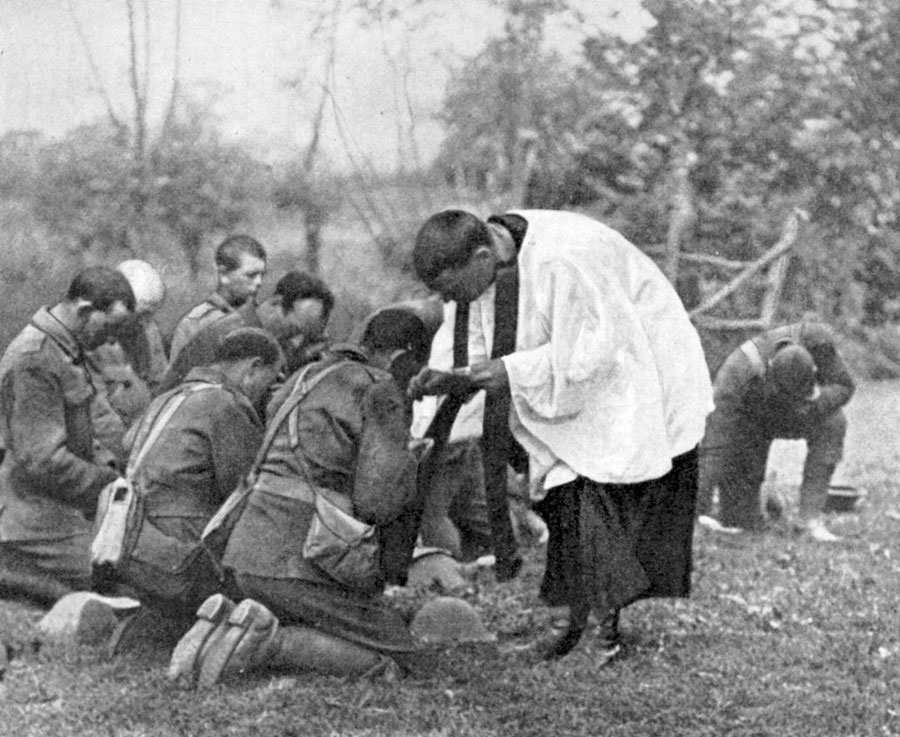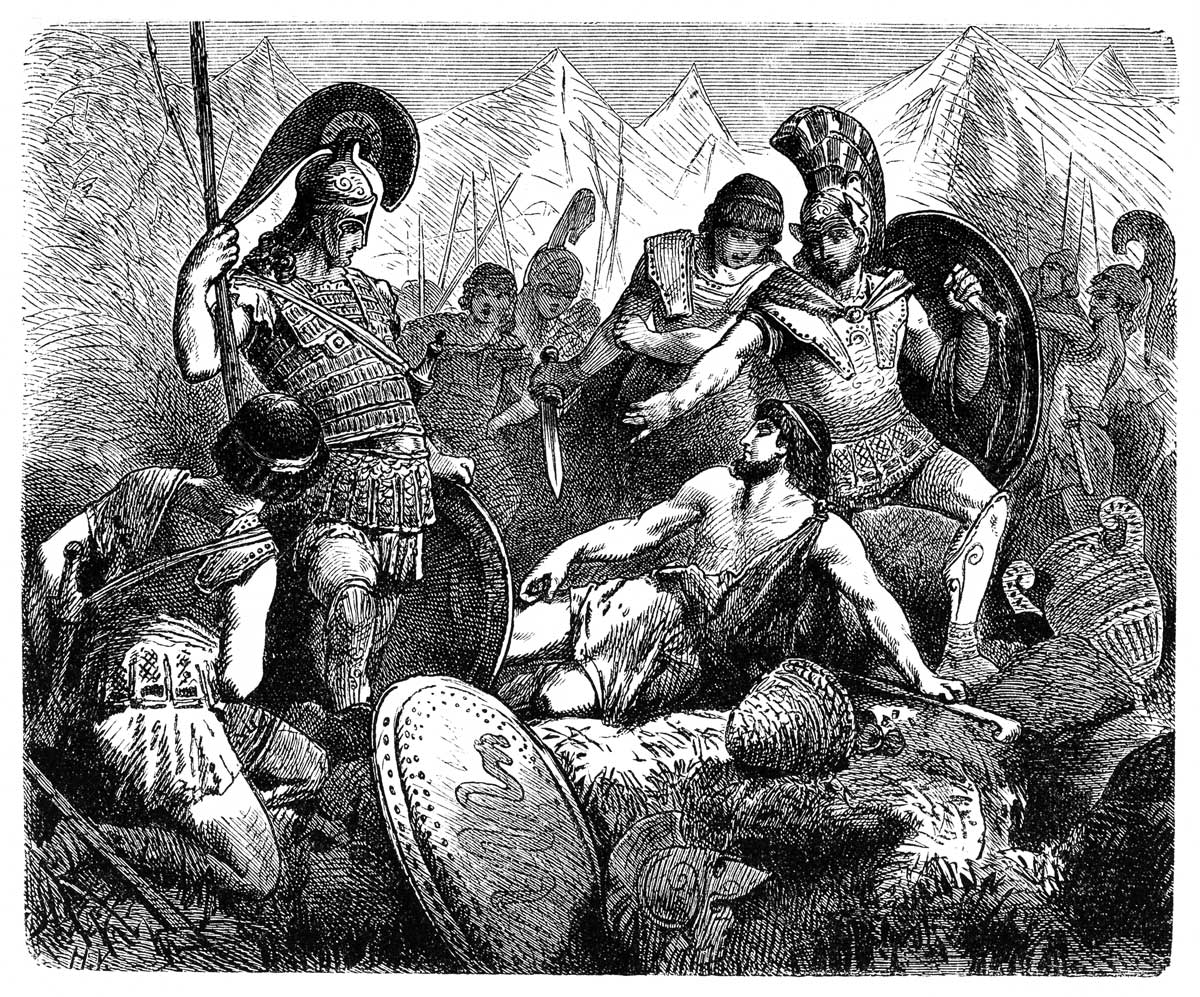Speaking in Tongues
Preston Jones on Language, Faith & Culture
In April 1998 James Brooke reported in the New York Times that of the some 300 American Indian languages that were spoken when Europeans arrived in what is now the United States and Canada, about 211 remain in use. “Despite five centuries of population decline, assimilation and linguistic oppression,” Brooke wrote, “most of North America’s Indian languages have survived to the end of the twentieth century.”
In recent years things have become desperate, for “with the impact of television and radio and increased mobility among Indians, North America’s native languages are suffering their sharpest free fall in recorded history.” Of the 175 native tongues still spoken in the United States, just 20 are still being passed on to young children. “In contrast, 70 languages are spoken only by grandparents, and 55 more are spoken by 10 tribal members or fewer.”
Language death is of course nothing new. The languages of the Hittites, Jebusites, Perizzites, and Amorites are not recognized by the United Nations, and Pictish, an ancient Scottish tongue, is beyond the comprehension even of specialists. What is relatively new is the widespread sentiment that the loss of languages is regrettable. Informing this regret is an admirable (if sometimes vague and sentimental) concern for native cultures and histories and the belief that the most precious thing about a language is its worth as a particular tool to reach the transcendent in a particular way.
As one woman told a United States Senate committee hearing on the plight of indigenous languages in North America, “I view the speaking of our language as a human right, given to us by the Creator. He chose what group and what individuals should be in those groups to speak those languages. As he gave the birds [their] individual songs . . . he gives us our languages.” “Indians interested in reviving traditional ways say they cannot pray to their ancestors in English,” Brooke noted, and cited the observation of a University of California scholar that some Indians are “starting to reinvent their languages so they can pray at ceremonies and funerals.” For some native peoples, faith and language are inextricable.
To proponents of the sink-or-swim economy, these views are mere sentiment. Audio-Forum can make a few dollars selling “Teach Yourself Choctaw” kits, but of what economic use is Eyak, which is now spoken by fewer than ten elderly people in south-central Alaska? Others believe that the only languages worth preserving are the ones in which great literature has been produced. Icelandic and Latin are in, Manx and Pawnee are out.
The preservation of a minority language is at the heart of numerous political movements around the globe. Believing that French should be preserved in the American South, some Louisianan communities are now establishing and strengthening ties with towns and cities in France, northern New Brunswick, and Quebec. Meanwhile Québécois nationalism, rooted in a persistent fear that the French spoken in North America’s upper-right-hand corner is imperiled, thrives; and in northwestern France Breton nationalists decry the slow decline of their Celtic tongue, in their view, a victim of Parisian imperialism.
The Decline of Welsh
And then there is Welsh, still spoken by some in a former Welsh colony in Patagonia, Argentina, and, according to the 1991 British census, by about 18 percent of the residents of Wales. In 1901 some 50 percent of the inhabitants of Wales could speak their country’s native tongue; ten years later that number fell to 43 percent. By 1951 just 28 percent of Welshmen could speak Welsh; and thirty years later only 19 percent could. Some scholars believe that Welsh will die as a living language by 2010.
The story of a small community in Wales called Pont-rhyd-y-fen, a stronghold of the Welsh language till after the Second World War, is typical. In 1951 close to 80 percent of the people in Pont-rhyd-y-fen spoke Welsh, compared to 28 percent in Wales as a whole. Less than 30 percent do now.
In the Journal of Ethnological Studies in 1992 Beth Thomas described what has become of Pont-rhyd-y-fen. “New work patterns, greater mobility, smaller and more scattered families have all left their mark on community life,” Thomas wrote. “Most of the community’s organized social activities came to an end in the 1950s and 1960s.”
One reason for this is that after the Second World War the emphasis on keeping the Christian Sabbath began to be ignored, and Pont-rhyd-y-fen’s young steelworkers were consequently expected to work on Sundays. “Young men were thereby given a ready excuse not to attend chapel services, and many of the community’s other social activities also suffered.”
But a watering down of the Fourth Commandment in itself cannot be blamed for the decline of this Welsh-speaking community. For while a turn to Sunday shift work caused great difficulties, “the spread of the mass media, television in particular, provided instant entertainment, in English, of a standard with which local drama and opera groups could not compete.” And so it came to pass that the time and energy that not long before had gone into preparing and producing amusements rooted in a community’s life gave way to Hollywood and London, and the talent of local actors, singers, poets, and musicians was set aside for the sake of television.
As modern frivolity thus found a home in Pont-rhyd-y-fen, its center crumbled. “Membership of the chapels is both aging and dwindling,” Thomas noted, “and chapel activities specifically aimed at the young, such as the Sunday schools, have over the past twenty years gradually ceased to be. This has meant the loss of virtually the only public domain the Welsh language had in the community.”
Christianity & the Language
There is no doubt that Welsh, like Québécois and the numerous native languages that were preserved in writing by Catholic and Protestant missionaries, owes its survival to the efforts of Christian people. Particularly important for the Welsh was the translation of the Bible into their tongue in 1588. The Welsh writer Wynford-Vaughn Thomas has rightly noted that “If ever one single book saved a language, that book is the Bible.”
And then there were the vibrant religious institutions of Wales that were devoted to spreading knowledge of the Bible and the Christian faith in Welsh. Indeed, when children were forbidden to speak Welsh in the public schools, they spoke, sang, and prayed in it in their Methodist, Congregationalist, and Baptist Sunday schools and chapels. It was in these places that Welsh was kept alive. In a 1989 interview on the BBC, Welsh theologian R. Tudur Jones was asked if there was a link between the decline in church attendance in this century and the decline in spoken Welsh. Yes, Jones replied, there was a very close connection.
“[B]ecause, right up to the First World War, the one massive institution that addressed the Welsh people in Welsh was the body of Non-conformist churches,” he said. “Once people attended chapel, and by attending chapel they were in the sound of the Bible, I mean the Welsh of the Bible and, of course, it enriched their vocabulary.”
For Jones, the decline of the Welsh chapel bodes ill not merely for religious and linguistic life in Wales but for its public life altogether. “[In] the type of training you had in a chapel, Sunday school, discussion groups, the [chapel] societies and so on, you were taught to express yourself, you were taught to put your ideas in order, you were taught also to listen to other people and to discuss with them, fairly rationally, their convictions and that, quite apart from the spiritual content, was a tremendous discipline in the art of living together and the art of democracy. When the chapels decline, lose their grip, all that kind of training goes for nothing, it gets lost.”
So what happens when the members of a minority linguistic community no longer hold to the things that, in the view of their forebears, made their languages worthwhile? Some, like many Welsh at the end of the twentieth century, claim that a popular soap opera (“Pobl y Cwm”—“People of the Valley”) and talent shows produced in their native tongue can provide the same existential significance as prayers and rituals did for their parents and grandparents.
Others pretend that the unending extension of American “McWorldism” is in fact the march of progress. Others simply watch their unique communities disintegrate, as have the residents of Pont-rhyd-y-fen and Inis Meain, a still Gaelic-speaking island off the west coast of Ireland. There, according a story by Dana Milbank in the Wall Street Journal, satellite dishes now suck CNN into Gaelic-speaking homes and “a new pier that will bring big ferries full of English-speaking tourists” has been erected next to an eighth-century church.
Recovering the Culture
But speakers of threatened languages could seek to recover something of what they have lost. And they can do that not simply by trying to rescue their language, but by returning to the religious cultures it often expressed.
Quebec’s French-speaking nationalists could remember that as long as their forebears embraced the same Catholic Church, French Canada’s collective identity was secure. They could recognize that if the occasional heavy-handedness and ineptitude of the Church in Quebec is regrettable, the thoughtless casting aside of a whole tradition, and thus of French Canada’s roots, is even more so. For the thing Québécois nationalists are looking for—namely, a firm sense of national identity—is wrapped up not primarily in the French language but in the very institution French Quebeckers have in large measure repudiated or simply allowed to atrophy. Much the same could be said of Welsh-speaking Wales.
Speakers of minority languages may thus be obliged to preserve their languages, not only because they feel a duty to the past and to their children, but also because their language is the vehicle through which members of their traditional culture worshiped God.
Preston Jones, a lecturer in history at Sonoma State university in California, has published several articles on Quebec and Wales in academia and popular publications. His last article for Touchstone was “Christians & Conservation” (May/June 1999).
Preston Jones teaches history at John Brown University.
bulk subscriptions
Order Touchstone subscriptions in bulk and save $10 per sub! Each subscription includes 6 issues of Touchstone plus full online access to touchstonemag.com—including archives, videos, and pdf downloads of recent issues for only $29.95 each! Great for churches or study groups.
Transactions will be processed on a secure server.
more on culture from the online archives
more from the online archives

35.4—Jul/Aug 2022
The Death Rattle of a Tradition
Contemporary Catholic Thinking on the Question of War by Andrew Latham
calling all readers
Please Donate
"There are magazines worth reading but few worth saving . . . Touchstone is just such a magazine."
—Alice von Hildebrand
"Here we do not concede one square millimeter of territory to falsehood, folly, contemporary sentimentality, or fashion. We speak the truth, and let God be our judge. . . . Touchstone is the one committedly Christian conservative journal."
—Anthony Esolen, Touchstone senior editor












